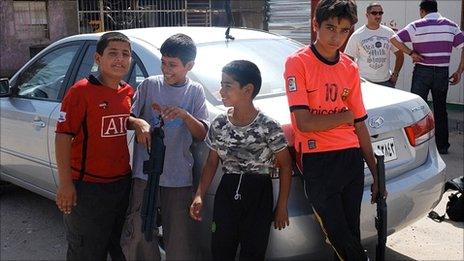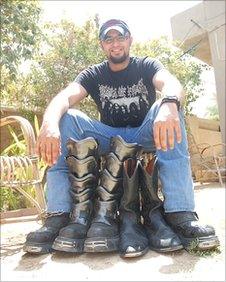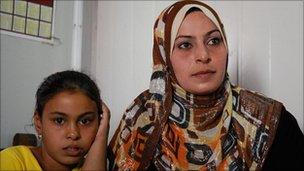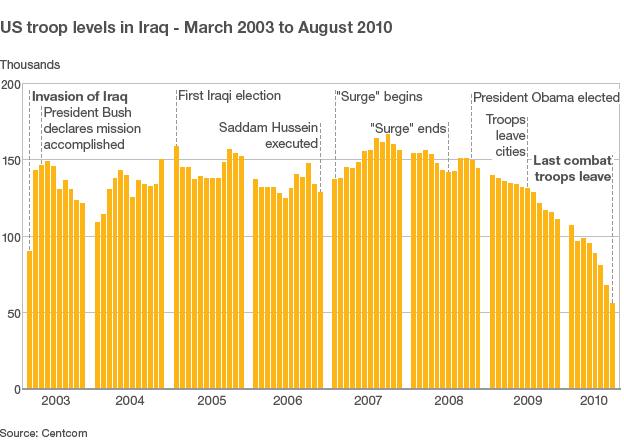Bittersweet memories of life in Iraq during invasion
- Published

Violence for children who have grown up during the seven-year invasion is a fact of life
On 1 September, the United States will officially end its combat mission in Iraq. The BBC's Gabriel Gatehouse in Baghdad meets two Iraqis with very different memories of the seven years since the invasion.
I met Laith in his drummer's bedroom. To a frantic beat and the screeching of guitars, he was waving his head frantically back and forth, gyrating and rocking his upper body.
It was all a bit unusual for a quiet residential Baghdad back street. But Laith is the singer and front man for an Iraqi heavy metal band called Nertun. Head-banging, he says, helps him to get rid of his anger and frustration.
Laith is 28 years old and has always been fascinated by America. When the invasion came in 2003, he had high hopes for the future. Weeks after the troops entered Baghdad, he got himself a job as a translator with the US military.
"I came home and said: 'I am going to work with the US forces,'" Laith told me in his colloquial American-English.

Laith, a former translator for the US army, says he feels less free than under Saddam's regime
"My mum was, like, 'What?!' She was surprised and shocked, and kind of a little bit afraid. Because she didn't know what people would think about that."
But Laith saw it as an opportunity to get to know Americans, not, as he put it, as invaders, but as people.
His family was initially supportive. But others in his community were not. In 2005, he started receiving death threats.
"A phone call came to me, on my mobile phone," he recalled, sitting in the garden in front of his home. "The voice on the other end of the line said: 'You have to stop working with infidels. You are working with people who invaded your country. Either you stop working, or we will bury you alive.'"
Fearing for his life, Laith eventually had to give up his job with the military. But his love for America is undimmed. Today, he works for the US government aid agency, USAID.
Broken promises
But many have less tender feelings.

Zeinab Mayouf is one of many thousands of widows created by the conflict
On the northern outskirts of Baghdad, there is a refuge for women and children who have been forced to leave their homes. Many are widows whose husbands have been killed during the last seven years of turmoil.
Outside the pre-fabricated huts, children play around in the dust. Many of the boys have toy rifles, which they are pointing at each other as they pull the trigger.
These are kids who have grown up around real guns, and for whom violence is a fact of life.
Zeinab Mayouf's husband was killed in 2005. She says he was shot by the Americans when the car he was travelling in failed to stop when ordered to.
"When the Americans came, we thought things would get better," she said, as her eight-year-old daughter clung to her arm.
"When Saddam was overthrown, we thought everything would change. But it didn't. After they killed my husband, I couldn't stand them."
The US military disputes her claim, and has rejected her application for compensation. Whatever the truth, Zeinab is one of many thousands of widows created by this conflict.
Uncertain future
Back in Laith's garden, the heavy metal fan says he is planning to move to Texas. His visa application has been approved and he is hoping that a new life in America will offer him a brighter future. But he is also nostalgic - for a past before US troops invaded his country.
"For me and my friends, [under Saddam] we were really more free. Because we could go out any time we wanted, listen to any type of music that we wanted."
Today, he says, he no longer feels free and secure wearing his heavy metal clothes in public, or indeed going openly to certain parts of the city.
"Now you cannot go wherever you want, because you are afraid. Before, the situation was secure.
"[It was a life] where if you went out and came back in the morning, you were not afraid that someone would attack you, you were not afraid that someone would kidnap you, or blow themselves up in a coffee shop or whatever."
Life in Iraq is much more secure than it was three years ago, when sectarian violence nearly plunged the country into a full-scale civil war.
As the sun sets over the Tigris in central Baghdad, families come out to enjoy a stroll along the banks of the river, the children playing on swings and slides in the park.
But shootings, explosions and suicide bombings still kill hundreds across Iraq every month. It is easy to be in the wrong place at the wrong time. Scenes of carefree family life mask a deeper uncertainty.
Many children will be too young to remember an Iraq without a sizeable US military presence.
But as the reality of the American withdrawal sinks in, many are concerned about what kind of country US troops are leaving behind them.
